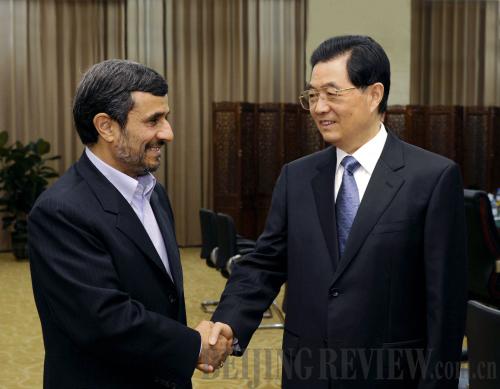|
 |
|
HIGH-LEVEL CONTACT: Chinese President Hu Jintao meets Iranian President Mahmoud Ahmadinejad in Astana, Kazakhstan, on the sidelines of the Shanghai Cooperation Organization Summit on June 14, 2011 (RAO AIMIN) |
China and Iran sympathized with and supported each other in their efforts to oppose hegemony. In July and October 1991, Chinese Premier Li Peng and President Yang Shangkun visited Iran respectively. In 1992, after the United States announced it was selling F-16 military aircraft to Taiwan, the Chinese Government hosted a high-profile reception for Iranian President Akbar Hashemi Rafsanjani in Beijing.
Iran provided support to China on human rights and Taiwan issues. China also respected the choices of Iranians. When Iran suffered international isolation, China and Iran maintained friendly ties and normal communication.
Trade cooperation
In the 1980s, economic and trade relations between China and Iran lagged behind their good political relations. Iran, under sanctions from the United States and other Western countries, needed to import huge quantities of goods from China. But China was then an oil-exporting country, and the small amount of crude oil it imported from Iran was exported to third countries. As a result, China had a substantial trade surplus with Iran. Bilateral trade volume hovered between $100 million and $200 million for a long time.
After 1997, refineries with desulfurization devices sprung up in China. While importing large amounts of crude oil from Iran, China exported electrical and mechanical products to the country.
Since the beginning of the 21st century, China's demand for energy has dramatically increased along with its rapid economic development. From 2000 to 2002, the amount of oil China imported from Iran was 7 million tons, 10.85 million tons and 11.107 million tons respectively, accounting for 10 percent, 18 percent and 15.16 percent of China's total oil imports. In 2001, Iran exceeded Oman to become the largest source of oil imports for China.
In recent years, Iran has exported 27 million tons of crude oil to China every year and is China's third largest energy supplier. Statistics of China's Ministry of Commerce show bilateral trade volume in 2010 was $29.382 billion, of which China's exports to Iran totaled $11.096 billion and its imports from Iran reached $18.286 billion.
Mutual support
A key reason for the progress in Sino-Iranian relations over the past four decades is China respects Iran's sovereignty, and never interferes in its internal affairs.
The political systems and values of China and Iran are dramatically different, but both countries pursue independent foreign policies, and do not accept the hegemony of foreign countries. China and Iran hold similar stances on many international issues. When facing pressure and interference from Western powers, the two countries need to support each other—mutual support that is of strategic importance to both.
The U.S. factor has long affected Sino-Iranian relations. The U.S.-Iran alliance, Sino-U.S. hostilities, U.S.-Iran hostilities, and the normalization of the Sino-U.S. relationship had huge impacts on Sino-Iranian relations. The U.S. factor is a reality China and Iran must face when handling and developing bilateral relations.
While the United States and Iran are hostile to each other, China and Iran are friendly. The United States expects China to work together with it to deal with Iran, but China, which pursues an independent foreign policy, will never be willing to follow U.S. footsteps.
Iran has become an important issue in Sino-U.S. relations, especially given China's increasing dependence on energy supplies from Iran and the emergence of the Iranian nuclear issue in 2003. The United States has called on China to follow U.S. policies on Iran, while Iran expects to gain support from China when facing pressure from the United States.
China needs to demonstrate great diplomatic skills in handling relations with the United States and Iran. The economies of China and Iran are tremendously complementary. A friendly relationship between the two countries contributes to the peace of Asia, Middle East, and the whole world.
The author was formerly China's ambassador to Iran | 